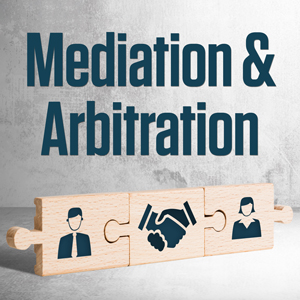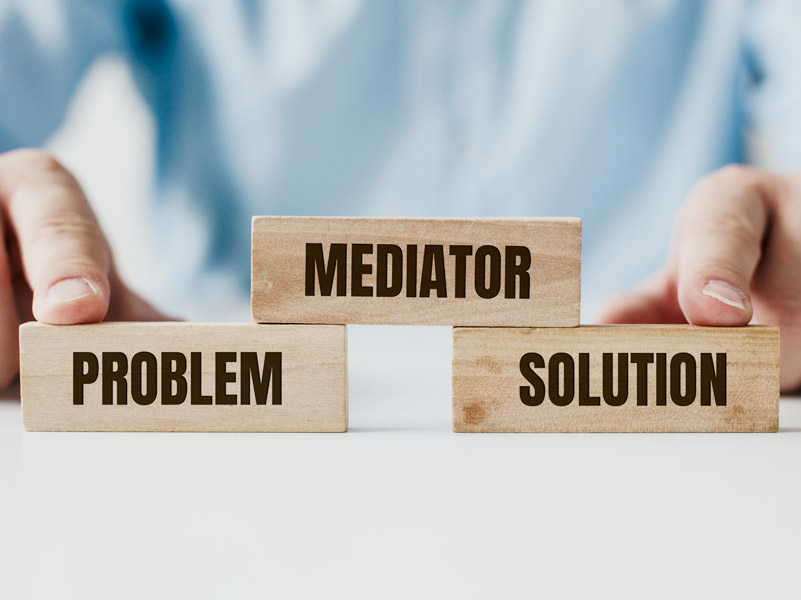
Blog
Resolving Business Disputes Efficiently: The Power of Mediation

In the dynamic landscape of business, disputes are almost inevitable. Whether it’s a disagreement over contract terms, failure to perform obligations, damages, breach of contract, default, or issues concerning commercial leases, conflicts can arise unexpectedly, disrupting operations and draining resources. However, amidst the chaos, there exists a powerful tool that offers a pathway to resolution without the protracted battles of litigation: mediation.
Mediation, a form of alternative dispute resolution (ADR), is gaining traction as a preferred method for resolving business disputes. Unlike traditional litigation, which often involves courtroom battles, prolonged timelines, and exorbitant costs, mediation offers a more efficient, cost-effective, and collaborative approach to conflict resolution. The mediators at the Georgia Center for Arbitration & Mediation (GCAMM) have experience in business law, running businesses, being entrepreneurs, and teaching college courses on various business topics. They bring creativity and their problem-solving skills to every mediation they perform. Let’s delve into the advantages of mediation across various facets of business disputes:
1. Swift Resolution
Time is money in the business world, and prolonged disputes can significantly impact productivity and profitability. Mediation offers a swift resolution compared to litigation, which can drag on for months or even years. With mediation, parties have the flexibility to schedule sessions at their convenience, avoiding the lengthy court procedures and waiting periods associated with traditional lawsuits. By addressing issues promptly through mediation, businesses can minimize disruptions and focus on their core operations.
2. Cost-Effectiveness
Litigation costs can escalate rapidly, encompassing attorney fees, court expenses, expert witness fees, and more. In contrast, mediation is generally more cost-effective, requiring fewer resources and reducing legal expenses. Since mediation sessions are conducted outside the courtroom, parties can avoid the hefty costs associated with formal litigation procedures. Additionally, the collaborative nature of mediation often leads to mutually acceptable solutions, mitigating the need for lengthy legal battles and further reducing costs.
3. Preservation of Business Relationships
Business disputes can strain relationships between parties, jeopardizing future collaborations and partnerships. Unlike litigation, which can exacerbate tensions and fuel animosity between adversaries, mediation fosters open communication and encourages parties to find common ground. Through constructive dialogue facilitated by a neutral mediator, businesses can preserve valuable relationships, paving the way for continued cooperation and mutual success in the future. Resolving business disputes does not have to be ugly.
4. Customized Solutions
One of the key benefits of mediation is its flexibility in crafting customized solutions tailored to the specific needs and interests of the parties involved. Unlike court judgments, which are often binary in nature (win or lose), mediation allows parties to explore creative options and devise innovative solutions that address their underlying concerns. Whether it’s renegotiating contract terms, developing payment plans, or exploring alternative dispute resolution mechanisms, mediation empowers parties to reach mutually beneficial agreements that may not be attainable through litigation.
5. Confidentiality
In the business world, confidentiality can be very important to your reputation or your staff’s sense of security. Thus, confidentiality is a critical advantage of mediation, particularly in the realm of business disputes. Unlike court proceedings, which are a matter of public record, mediation sessions are confidential and conducted behind closed doors. This confidentiality fosters a safe environment for parties to freely express their concerns, without fear of damaging their reputation or disclosing sensitive information to competitors. Confidentiality encourages open dialogue and enables parties to explore potential solutions without the fear of adverse publicity.
6. Greater Control and Empowerment
In litigation, parties relinquish control over the outcome to judges or juries, subjecting themselves to unpredictable rulings. In contrast, mediation empowers parties to retain control over the resolution process and actively participate in shaping the outcome. By engaging in constructive dialogue and negotiation, parties can exercise greater control over the final agreement, ensuring that their interests and objectives are adequately addressed. This sense of empowerment can lead to more satisfactory outcomes and foster a sense of ownership over the resolution.
7. Preservation of Business Reputation
Public perception is crucial in the business world, and protracted legal battles can tarnish a company’s reputation, eroding consumer trust and investor confidence. Mediation offers a discreet and confidential forum for resolving disputes, shielding businesses from the negative publicity associated with courtroom litigation. By resolving conflicts amicably through mediation, businesses can mitigate reputational risks and maintain their standing in the marketplace, preserving their brand integrity and credibility.
Conclusion
In today’s fast-paced business environment, disputes are an inevitable aspect of commercial dealings. However, how these conflicts are resolved can make all the difference in maintaining business continuity, preserving relationships, and safeguarding profitability. And the GCAAM mediators understand this. Mediation offers a compelling alternative to traditional litigation, providing a swift, cost-effective, and collaborative approach to resolving business disputes. By embracing mediation, businesses can unlock a pathway to resolution that prioritizes efficiency, flexibility, and constructive dialogue, ultimately fostering long-term success and sustainability in an ever-evolving marketplace. If you have an issues with your commercial lease, contract negotiations, contract default, shareholder grievance, consider mediation as the best alternative. Contact us today for additional information or to start the mediation process.








